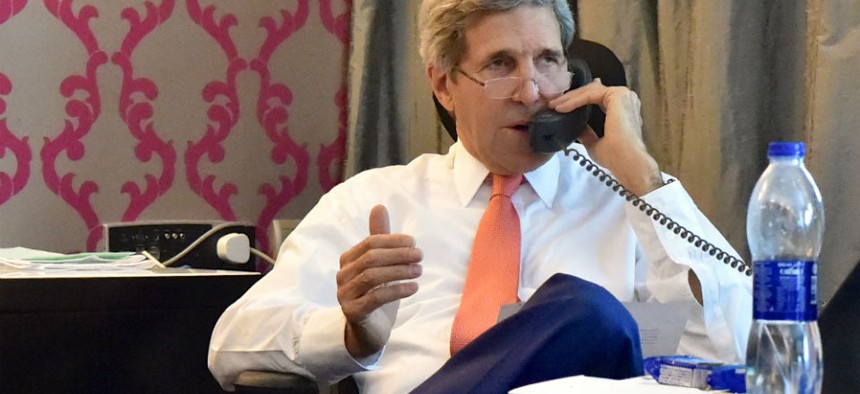
U.S. Secretary of State John Kerry works the phones on July 25 in Cairo to negotiate a ceasefire in Gaza. State Department
As the World Burns, Senate Leaves Key Diplomatic Posts Vacant
In Africa alone, where Ebola rages and terrorists regroup, the vacancy rate is 20 percent.
Among the many tasks senators left dangling when they departed for their August recess, are nominations for dozens of ambassadors, many of whom have been on hold for more than a year.
The American Foreign Service Association, the union of current and former diplomats, on Friday blasted the Senate’s failure to confirm 34 career nominees and 20 others that will “damage America’s reputation and weaken our country’s national security interests.”
Citing 59 vacancies in 186 posts worldwide, the group noted that most of the nominees had already been through hearings and bipartisan votes by the Senate Foreign Relations Committee.
Chairman Robert Menendez, D-N.J., “went out of his way to have a vote on qualified nominees and we commend him for his leadership, but clearly political bitterness took over in the Senate last night,” said AFSA president Bob Silverman. “The fact that other nominations went through without objection indicates that some in the U.S. Senate don’t care about the role of American diplomacy in promoting national security and job creation. What happened last night is deplorable.”
AFSA called on the Senate to make prompt voting on the career nominees a priority in September, preferably thorough “bloc” votes, as is common for military nominees, the group noted.
The chief region of concern, AFSA spokeswoman Kristen Fernekes told Government Executive, is Africa, where there is a 20 percent vacancy rate and nine career diplomats have been waiting for an average of more than seven months. “With major U.S. interests in the region -- Ebola outbreak, [Islamic terror group] Boko Haram, general security issues, and economic development opportunities -- and the fact that we’re hosting a very important and high-profile U.S.-Africa Leaders Summit here in Washington next week, it would be in everyone’s interest to have those positions filled,” she said.
Earlier this year, AFSA took a rare position against ambassadorial nominations made by President Obama (and his predecessors) whose chief qualifications appeared to be in campaign fundraising, not in the countries where they would be posted.
Among the most controversial were hotel chain CEO George Tsunis as ambassador to Norway; TV producer Colleen Bell as envoy to Hungary; and political consultant Noah Bryson Mamet for Argentina. Other Obama campaign fund-raisers nominated include former Major League baseball player Mark Gilbert for New Zealand and Boston attorney Rob Barber for Iceland.







